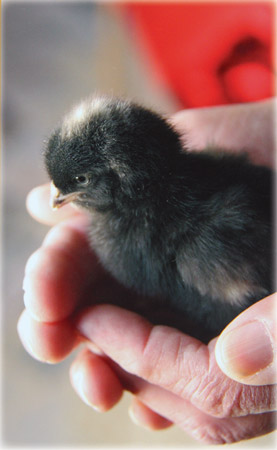By Harley-Anne Hamilton.

Newly hatched chick at Santos Farm, Kingston.
The first thing you need to do is to see how friendly your hometown is about chicken ownership. Many communities have rules about flock numbers, as well as coop regulations. Google the name of your town and “flock size limits” to find your town’s regulations. You also can check out www.Mass.gov/info-details/massachusetts-law-about-backyard-chickens.
Next, you want to investigate what breed you want to raise. Maybe you like the looks of some but want more egg production. Or maybe you want friendly chickens that are curious and calm. These are some of the things you need to consider. Check out www.thehappychickencoop.com/chicken-breeds to find the best breed for you. If you know people who are raising a flock, talk to them about their experience. Maybe they can become your mentors. Also, ask lots of questions at the feed store where you’re thinking of getting your chicks.
Once you’ve decided on the breed, you’ll want to spend time learning about their care and what they need to grow into healthy birds. Setting up their home is especially important. While they are baby chicks, they must stay warm. Chicks are often kept inside with a heat lamp over them and fed with starter crumble (bird feed) to give them all the nutrients they need to get big and strong. Similar to how your mom might tell you to eat your greens so you can grow strong and healthy!
These websites are helpful for understanding how to set up a backyard coop: www.Extension.iastate.edu/smallfarms/establishing-backyard-poultry-flock and www.MSPCA.org/pet_resources/chicken-ownership-and-adoption
FINALLY, you are ready to go pick out your chicks and bring them home. As they grow, you will need to change their living quarters, such as adding a screen to keep them inside their home so they don’t go off on risky adventures to test their wings! They will need to be weaned off their warming light, and eventually, you’ll need to introduce new food. In the next issue, we’ll talk about making adjustments to handle your flock’s growth and health needs for space, nutrition, hygiene, and laying eggs for your family.
Harley-Anne Hamilton is our new Kool for Kids writer. She works numerous jobs, including on a local farm and as the Programming Assistant for the Plymouth County Extension Office—all while finishing up her senior year at Quincy College.

Download and color. Send your finished artwork to Info@EdibleSouthShore.com for a chance to be posted on our virtual refrigerator.







